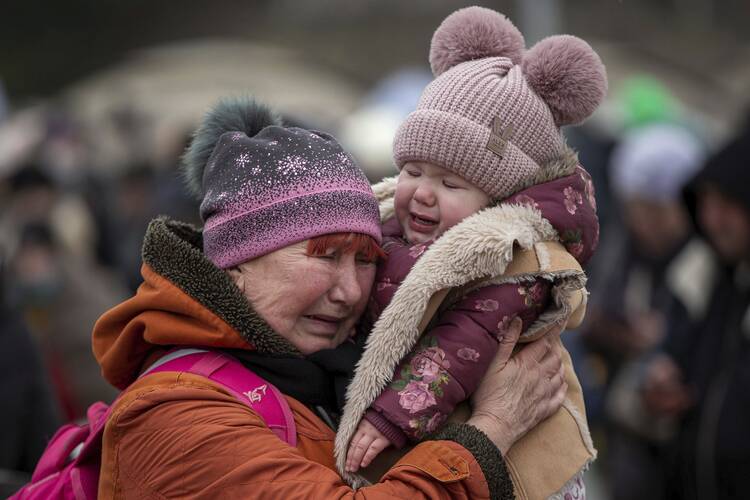A Reflection for the First Tuesday of Lent
“From all their distress God rescues the just” (Ps 34:17).
On a recent car ride, I noticed an ambulance, lights flashing and siren wailing, barreling down on our minivan. I pulled to the side of the road, and my 5-year-old yelped with excitement as the vehicle tore by. Then he paused, said the Sign of the Cross and prayed, “Dear God, please pray for all people who are in distress.” Surprised, I asked him where he’d learned the prayer. He said his kindergarten teacher at his Catholic school had taught it to his class after they had all heard fire engine sirens from their classroom.
I think of his little prayer often these days, as the world seems to be so filled with people who are in distress: from the continuing struggle with Covid-19, to the war in Ukraine; from those who will be impacted by irreparable climate change, to those who are experiencing the devastating effects of systemic and personal racism. In the face of such suffering, it is easy to read the claim in today’s responsorial psalm—“From all their distress God rescues the just”—and think, I’ll believe it when I see it.
In the face of such suffering, it is easy to read the claim in today’s responsorial psalm—“From all their distress God rescues the just”—and think, I’ll believe it when I see it.
But our faith requires belief in all that is seen and unseen. We believe that God’s help will arrive, in one way or another, for all who ask for it. The psalm reminds us: “I sought the LORD, and he answered me/ and delivered me from all my fears.”
And so we continue to seek the Lord in the midst of our distress. But how do we speak to a being who at times seems to have forgotten us? The Gospel offers an answer in the form of the Our Father, a prayer so common it’s all too easy to recite it mindlessly rather than meditatively. But when we pay attention to the words of that prayer, we can see that in just a few short lines, it says so much: We praise God’s name, turn over our lives to God’s will, ask for what we need to nourish ourselves. We ask to give and receive mercy and we ask for God’s guidance in the future. It is in many ways the perfect prayer to a God who also, the Gospel reminds us, “knows what you need before you ask him.”
Get to know Kerry Weber, executive editor
What are you giving up for Lent?
Sweets and watching TV/videos on my phone.
Do you cheat on Sundays?
Philosophically speaking, I am not opposed to this. Theologically speaking, I object to the premise. But personally, I find it hard to maintain my Lenten sacrifice if I don’t just go cold turkey.
Favorite non-meat recipe
Canned chickpeas pan fried in butter and garlic. Stir in red pepper flakes and a squeeze of lemon. Spoon over rice and add avocado.
Favorite Lenten poem
Is it too cliche to choose “Ash Wednesday” by T. S. Eliot?








